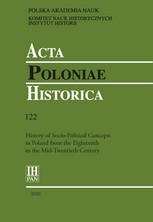THE INSTITUTION OF COUNCIL OF THE SENATE IN THE POLITICAL SYSTEM OF THE POLISH-LITHUANIAN COMMONWEALTH UNDER THE RULE OF LADISLAUS IV VASA (1632–48)
THE INSTITUTION OF COUNCIL OF THE SENATE IN THE POLITICAL SYSTEM OF THE POLISH-LITHUANIAN COMMONWEALTH UNDER THE RULE OF LADISLAUS IV VASA (1632–48)
Author(s): Artur GoszczyńskiContributor(s): Tristan Korecki (Translator)
Subject(s): Political history, Economic policy, Government/Political systems, Military policy, Political behavior, Politics and society, 17th Century
Published by: Instytut Historii im. Tadeusza Manteuffla Polskiej Akademii Nauk
Keywords: the Senate of the Polish-Lithuanian Commonwealth in the seventeenth century; Council of the Senate; Sigismund III Vasa; Ladislaus IV; Polish nobility in the seventeenth century; Adam Kazanowski;
Summary/Abstract: Established under the Henrician Articles of 1573, the institution of Council of the Senate was supposed to be a standing advisory body to the rulers of the Polish-Lithuanian Commonwealth. Over the first few decades of its existence, the monarchs did not respect the obligation to appoint resident senators as the Council’s members. This changed only in 1607, as a result of a conflict between the king and the estates and the Rebellion of Sandomierz – the events that mobilised the nobility to enforce the monarch to observe the law in this respect. Since the beginning of his reign, Ladislaus IV Vasa fairly readily convened meetings of the Council, at which its members expressed their opinions on the current problems. The deliberations were usually about the state’s foreign policy, the functioning and internal security of the state, the affairs of war and peace, the military and the treasury, the king’s or the royal family’s private affairs, the Commonwealth’s feoffs, and matters related to private affairs of members of the power elite. Resulting from the monarch’s actions that did not win popularity in the nobility-dominated society, the Chamber of Deputies started with time perceive the Council as an institution detrimental to the state’s interest. The Chamber consequently extort from the king and the senators the duty to read out the reports on the senatus consilia at the diet (sejm) forum. Consequently, the upper chamber’s position was weakened and the Council of the Senate politicised – a process that directly affected Poland-Lithuania’s political system, vastly contributing to its degeneration.
Journal: Acta Poloniae Historica
- Issue Year: 2020
- Issue No: 122
- Page Range: 181-207
- Page Count: 27
- Language: English

